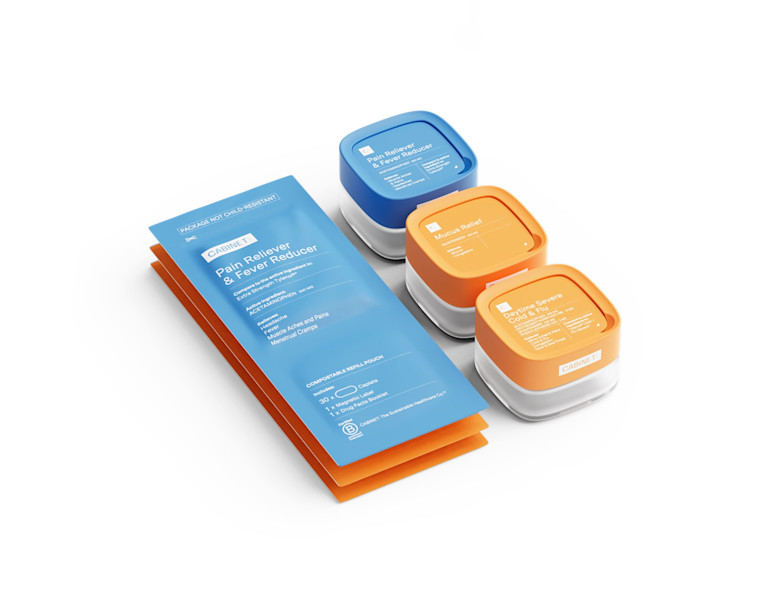Get relief with Cabinet Acetaminophen Pain Reliever & Fever Reducer: Find it on Amazon. Cabinet’s best-in-class medicines are shipped right to your door in eco-friendly packaging and stunning refillable glass bottles!
Dayquil is a commonly used over-the-counter medication that provides relief from symptoms of the common cold and flu. However, it's important to be aware of the potential side effects that may accompany its use. By understanding these side effects, you can make informed decisions about whether to use Dayquil and how to do so safely.
What is Dayquil?
Dayquil is a combination medication that contains several active ingredients. These ingredients, including acetaminophen, dextromethorphan, and phenylephrine, work together to alleviate symptoms such as nasal congestion, coughing, and minor aches and pains. It is available in various formulations, including liquid, capsules, and tablets.
When you're feeling under the weather, Dayquil can provide much-needed relief. Whether you have a stuffy nose, a persistent cough, or a headache, this over-the-counter medication is designed to help you get back on your feet. But have you ever wondered how Dayquil works and what exactly is in it?
The Composition of Dayquil
The specific composition of Dayquil may vary slightly depending on the formulation, but typically it contains:
Acetaminophen: A pain reliever and fever reducer.
Dextromethorphan: A cough suppressant that helps reduce coughing.
Phenylephrine: A nasal decongestant that helps relieve nasal congestion and sinus pressure.
These ingredients work together synergistically to target multiple symptoms at once. Acetaminophen helps reduce pain and fever, while dextromethorphan suppresses the urge to cough. Phenylephrine, on the other hand, clears up nasal congestion and relieves sinus pressure. By combining these active ingredients, Dayquil provides comprehensive relief for common cold and flu symptoms.
The Purpose and Use of Dayquil
Dayquil is intended to provide temporary relief from the symptoms of the common cold and flu. It is not a cure for these illnesses, but rather aims to alleviate symptoms so that individuals can continue with their daily activities more comfortably. It is important to note that Dayquil does not treat the underlying cause of the illness.
When you're sick, it can be challenging to go about your daily routine. The common cold and flu can leave you feeling drained and miserable. Dayquil steps in to help you manage your symptoms, allowing you to power through your day with less discomfort. However, it's crucial to remember that Dayquil is not a substitute for rest and proper care. While it can provide temporary relief, it's essential to give your body the time it needs to heal.
Moreover, it's important to use Dayquil as directed. Taking more than the recommended dose can lead to adverse effects and may not provide additional relief. Always read the label and follow the instructions carefully to ensure you're using the medication safely and effectively.
So, the next time you find yourself battling the common cold or flu, reach for Dayquil to help ease your symptoms. With its combination of active ingredients, it's designed to provide comprehensive relief and get you back on track to feeling your best.
Common Side Effects of Dayquil
Like any medication, Dayquil may cause side effects in some individuals. These side effects are generally mild and temporary, but it's essential to be aware of them.
When taking Dayquil, it is important to note that while many individuals may not experience any side effects, some may have a different reaction to the medication. It is always recommended to read the label and follow the recommended dosage instructions.
Physical Side Effects
Some individuals may experience physical side effects when taking Dayquil. These may include:
Drowsiness or sedation: Dayquil contains ingredients that may cause drowsiness in some individuals. It is important to avoid activities that require alertness, such as driving or operating heavy machinery, if you experience this side effect.
Dizziness: Dayquil can sometimes cause dizziness, especially when standing up quickly or moving suddenly. It is advisable to take caution and avoid sudden movements to prevent any accidents or falls.
Nausea or upset stomach: In rare cases, Dayquil may cause nausea or an upset stomach. If you experience this side effect, it is recommended to take the medication with food to help alleviate these symptoms.
Headache: While Dayquil is often used to relieve headaches, it is possible for some individuals to experience a headache as a side effect. If this occurs, it is advisable to consult a healthcare professional for further guidance.
While these side effects are typically mild and temporary, it is essential to pay attention to your body's response. If any side effects persist or worsen, it is recommended to consult a healthcare professional for further guidance.
Psychological Side Effects
In rare cases, Dayquil may cause psychological side effects. These may include:
Restlessness or irritability: Some individuals may experience restlessness or irritability when taking Dayquil. If you find yourself feeling agitated or restless, it is advisable to discontinue use and consult a healthcare professional for further evaluation.
Nervousness or anxiety: Dayquil can occasionally cause feelings of nervousness or anxiety. If you experience these psychological side effects, it is important to seek medical advice to determine the best course of action.
Difficulty sleeping: While Dayquil is not typically known to cause sleep disturbances, in rare cases, some individuals may experience difficulty sleeping. If this occurs, it is recommended to discontinue use and speak with a healthcare professional for further evaluation.
If you experience any of these side effects, it is advisable to discontinue use and speak with a healthcare professional for further evaluation. They will be able to provide personalized advice and determine if an alternative medication or treatment is necessary.
Uncommon but Serious Side Effects
While uncommon, some individuals may experience serious side effects when taking Dayquil. These side effects require immediate medical attention.
Allergic Reactions to Dayquil
In rare cases, an individual may develop an allergic reaction to Dayquil. Signs of an allergic reaction may include:
Hives or rash
Swelling of the face, lips, or throat
Difficulty breathing or wheezing
If you experience any of these symptoms, seek immediate medical attention or call emergency services.
Long-term Side Effects
Long-term use of Dayquil or excessive dosages may lead to more severe side effects. However, when used as directed and for short durations, the risk of long-term side effects is minimal. Always follow the recommended guidelines and consult a healthcare professional if you have any concerns.
Interactions of Dayquil with Other Medications
It's important to be aware of potential interactions between Dayquil and other medications. These interactions can occur with both over-the-counter and prescription drugs.
Over-the-counter Drug Interactions
Some over-the-counter medications may interact with Dayquil. Examples include:
Other cold and flu medications
Pain relievers
Allergy medications
Always read the labels and follow the instructions for each medication to ensure safe usage. If you are uncertain about potential interactions, consult a healthcare professional.
Prescription Drug Interactions
Dayquil may also interact with certain prescription medications. It's important to inform your healthcare provider about all the medications you are taking, including Dayquil, to avoid adverse reactions. Examples of medications that may interact with Dayquil include:
Monoamine oxidase inhibitors (MAOIs)
Antidepressants
Blood pressure medications
Your healthcare provider can provide guidance on whether it is safe to use Dayquil alongside other prescription medications.
How to Safely Use Dayquil
When using Dayquil, it's important to follow the recommended dosage and usage instructions to ensure safety and efficacy.
Recommended Dosage and Frequency
For adults and children 12 years and older, the typical recommended dosage of Dayquil is:
Take two capsules or tablets every four to six hours, as needed
Do not exceed eight capsules or tablets in a 24-hour period
Follow the instructions on the packaging for liquid formulations
It is important to adhere to these guidelines and avoid exceeding the recommended dosage, as doing so may increase the risk of side effects.
What to Do in Case of Overdose
If you believe you have taken too much Dayquil or have accidentally ingested more than the recommended dosage, seek immediate medical attention. Overdosing on Dayquil can lead to serious health complications. It's important to provide healthcare professionals with accurate information about the amount and type of medication ingested for appropriate treatment.
By understanding the potential side effects of Dayquil and following the recommended usage guidelines, you can use this medication safely and effectively to alleviate the symptoms of the common cold and flu. However, if you have any concerns or questions, it's always advisable to consult a healthcare professional for personalized advice and guidance.











